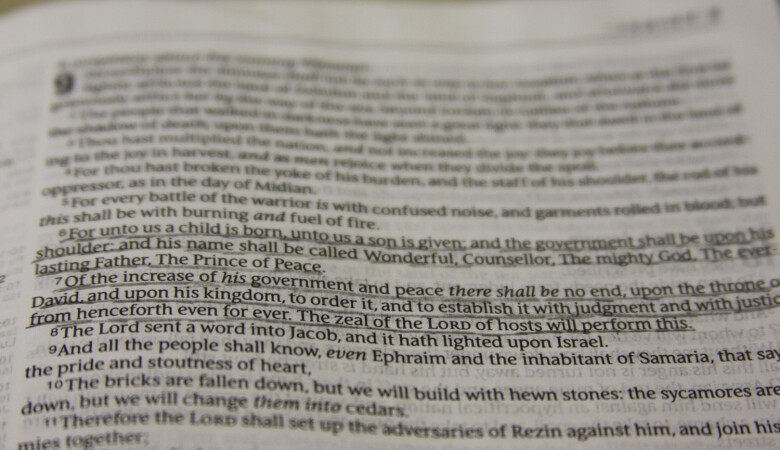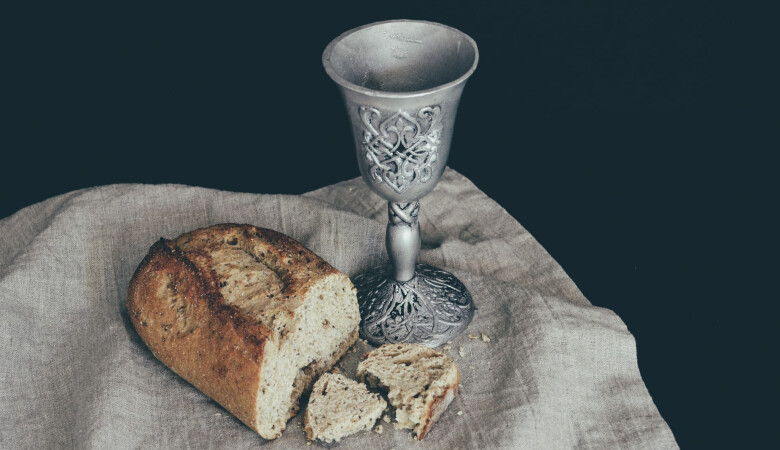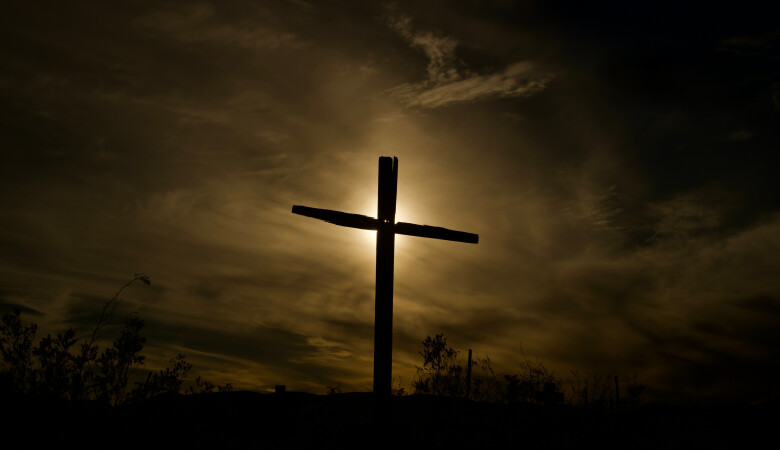The Eternal Gospel: Proclaimed Once Again
April 08, 2012 | Andy Davis
1 Corinthians 15:1-8
Resurrection of Christ
Pastor Andy Davis preaches a verse-by-verse expository sermon on 1 Corinthians 15:1-8. The main subject of the sermon is the eternal Gospel proclaimed.
- SERMON TRANSCRIPT -
You know, all over the world, our brothers and sisters are assembling in places like this one and meeting together to celebrate the greatest victory there has ever been; the victory of the cross and the empty tomb. I never separate them. They're completely together. Christ, by His death, destroyed him who holds the power of death, and freed those who all their lives were held in slavery by their fear of death. And that's a lot of people. Every culture, every tribe and language, and people, and nation have their own death rituals, and in some way, they testify to their fear of death and their desire for life to continue as they've known it, that death is an interloper. Their terror of death testified by some of the strange actions that they do.
I was reading about how in March of 1974, some archeologists, actually just some Chinese workers first, and then archaeologists later, discovered a terracotta, a clay army, that was constructed by an emperor who was seeking, in some way, to live forever. You know the old saying, "You can't bring it with you." He sought to bring his army with him. And so these were life-sized terracotta replicas, warriors that were buried with him over a 22 square mile system of caverns and other places, and they're only now still excavating some of it. And each one of them in some way different than all the others. An incredible amount of labor went into these terracotta soldiers, 221 B.C.
So over 2,000 years ago this individual testified to his fear of death, and his desire that life should go on as he'd known it. If you learn about that, the man who called himself the first emperor of China, he did everything he could to stay alive. Some alchemists told him that there was a series of three islands off the coast of China where an elixir was that if he could gain it and drink it he could live forever, and he was told that the only emissaries that'd be welcomed at those islands were children. So he actually got a bunch of children together and sent them off to find this elixir. They never returned. Eventually he concluded that he had to go himself and he went. And there, he contracted an illness where he died. Right before as he was laying, dying in his fever, he did everything that he felt necessary to bequeath the power of the throne to his son, the son of his choice. But his trusted counselor wanted power for himself, and the only way he could really finagle it and do an end run around the emperor’s dying wishes was to conceal the emperor's death until they got back to the capital city, so he bought a huge load of salted fish, and the aroma over masked the stench of the emperor's rotting corpse.
There is only one remedy for death, and it's the Gospel of Jesus Christ. The death, burial and resurrection of Jesus Christ is the only remedy there is. And the Vikings can put their warriors with their weapons in long boats, and they can set them ablaze and set them out adrift, but that's not going to conquer death, neither the pyramids, and the mummification of the Pharaohs and all of the gold and silver and accoutrements they brought with them. None of it. The putting of the gold coin under the tongues of the Greeks and the Romans to cross the river Styx, the fact that the Mayans put maize, they put corn in the mouths of the dead, and whistles in the shape of gods and goddesses, so that they could find their way to the spirit world. All of it testifying to people's enslavement to fear of death and their desire to live forever. And we have the secret. We have the truth. We have the statement of Jesus Christ, "Because I live, you also will live. I am the way and the truth and the life, no one comes to the Father except through me."
And today we get to look again at the Gospel message. We get to look at the simple proclamation of this gospel that Paul gave us in 1 Corinthians 15:1-8, which you heard Tom read. And as we look at this and as we study, my prayer is that you who have been saved, who are already saved when you came in, you're already justified would be strengthened in your faith by looking at the same Gospel that continues to save you, and that your salvation process will be strengthened and empowered by hearing this gospel again. And those of you that are here as guests, as visitors who have never trusted in Christ, that you would find salvation through faith in this Gospel message.
I. The Eternal Significance of the Gospel
And so he begins in verse one and two, "Now brothers, I want to remind you of the gospel I preached to you, which you received and on which you have taken your stand." Now, this is the apostle Paul bringing the minds of the Corinthian church back to his ministry in their midst. How he had said earlier, "I resolved, to know nothing while I was with you, except Jesus Christ and Him crucified.” He had previously been rejected, and mocked, and scoffed, in the Areopagus in Athens, and he went there with a simple commitment to preach the Gospel in Corinth. And so he did preach, and this church, this Corinthian church, sprang up out of nothing, out of dust, out of spiritual deadness, this church sprang up. But now, years later, he's writing back to them again, a talented and troubled church, and he wants them to remember the Gospel. And so he says, "I want to remind you. I just want to speak the gospel word to you again. I want to make it known to you." And we've already talked about this recently, talked about it a few days ago, Good Friday, we mentioned it a few weeks ago, how prone we are to forget.
When we were talking about the Lord's Supper, how the Lord established the Lord's supper as a repeated reminder of his death, and his resurrection, and his second coming because we are prone to forget. Something that the book of James likens to someone who, you know, when they hear scripture, it's like a man who looks at his face in the mirror and then immediately forgets what he looks like and goes away. We're forgetful, aren't we? And so the apostle Paul wanted to remind the Corinthian church of the Gospel. And it's interesting too because this is the Gospel that they received. He's writing to brothers. He says, "Now brothers, I want to remind you of this gospel." And so this speaks a very clear message to me. I believe the overwhelming majority of those of you listening to me right now are regenerate, you're born again. But you need to hear the gospel, and you need to keep hearing it. You need to hear it again and again and have it unfolded in front of you again, and again. I think a church that stops preaching the Gospel has stopped being a church. There might be other names for it, but it's no longer the pillar and foundation of the truth. It's no longer carrying on it’s ministry in the world, of testifying to the Gospel of Jesus Christ.
"A church that stops preaching the Gospel has stopped being a church."
On the other hand, a church that never gets past the bare facts of the gospel that I'm going to recount here today, is immature, still sipping on milk and should be moving beyond it. And so we can't only do these basic facts week after week. And so there's a balance here. But it's reasonable for us today to look again at the basic facts of the gospel of Christ's death, his burial, and his resurrection according to the scripture, and the Apostle Paul thought it was appropriate for this Corinthian church as well. "Now, brothers, I want to remind you of this gospel, the gospel that I preached to you." This is the Gospel that he said was entrusted to him, and he proclaimed it to them, and he said, "On this gospel, they have taken their stand." Do you see that? This Gospel is the foundation of their existence, as a Church, as a people, and then individually as each one of them had their own standing before God. This Gospel was the foundation of that standing. 1 Corinthians 3:11, Paul says, "For no one can lay a foundation other than that which is laid, which is Jesus Christ.”
Just as Christ had said in another place, The Sermon on the Mount, "Therefore everyone who hears these words of mine and puts them into practice is like a wise man who built his house on the rock. And the rains came down, and the streams rose, and the winds blew and beat against that house; yet it did not fall, because it had its foundation on the rock." Friends, this is the rock. This is the Gospel. It's never going away. It is unshakable. It is the sure, solid foundation of your soul, and of the Church. It can never move. "And on this Gospel," he says, "you have taken your stand." Isn't it good to know you have some solid ground under your feet as you fight the world, the flesh, and the devil? Isn't it wonderful to know that you have some solid ground under your feet as you face your maker, unafraid? Because of this gospel, you have taken your stand. And he said in verse 2, "By this gospel, you are saved..."
Now, the Greek could go either way. The grammar could go either way. It's either, by this Gospel you have been saved, or, by this Gospel you are being saved. It could go either way. And so the language is kind of right in the middle because both are true. It is true that by this Gospel we were saved, if we're Christians. This is speaking of the truth of justification, of the instantaneous, the beginning of the Christian life. Where, as you hear this message and having believed it, having received it, he says, "This gospel I preach to you, which you received,” receiving it by faith, taking it into yourself, by that Gospel, you were saved. This is the doctrine of justification by faith. You must not merely hear the message. You must receive it. Your heart must be like soft upturned soil, waiting for the seed of the Word. It's a noble and good heart, that's what it says in the parable, that's ready to receive the Word. And this gospel you received, it's the opposite of a hard heart that rejects the message as soon as it's heard and the birds come and eat it right away. He has no interest in it. The hardness of the heart. Isn't it beautiful how God takes out the heart of stone and gives the heart of flesh? What a gift.
And if you're a Christian today, that's what God did to you. You received the gospel. It's the same as in John 1:12, "But to all who did receive him, who believed in his name, he gave the right to become children of God." That's what happened to you. By the sovereign grace of God, if you're a Christian, you received this Gospel message. And by this Gospel, you were saved. You were saved from the wrath of God. There is no condemnation for you now because you have been justified, the righteousness of Christ imputed to you. So you were saved the moment you heard it and believed it, you were justified. But it's also true that you are, by this Gospel being saved. The gospel continues to be the power of God for your salvation, because your salvation isn't finished yet. And so you are to work out your salvation with fear and trembling. You are to become more and more godly, more and more Christ-like by the power of the Spirit, in the pattern of the laws of God. And by this Gospel, that process is going to continue. You'll never be through with the Gospel, the good news that your Savior is Jesus, and he is saving you from your sins. So by this Gospel, you are saved.
And then comes this troubling word, "if”. “If." People don't like that, the "if" word, but there it is. "By this gospel you are saved, if you hold firmly [to the end, this gospel].” “…if you hold firmly the word I preached to you. Otherwise, you have believed in vain." Those of you that have been listening to the preaching in Hebrews, this is not a new theme to you. It's not those who begin the Christian race, dear friends, it's those who finish, but everyone who truly begins will certainly finish. And so you must continue to believe the Word. You must continue to hold fast to this Word. And if you are genuinely converted, you will. The God who gave you the faith to begin with will sustain it and nourish it until you no longer need it anymore. And you'll lay it down and your faith will become sight, and you will be in his presence, but he will continue to nourish and sustain that faith through the message of the Gospel. So you have to continue to believe this Word. This is not an independent salvation, we're talking about. You're not ever independent from Jesus. He will always be your vine and you the branch, and you will draw from him nourishing sap for the rest of your lives.
So, by this Gospel, you are saved if you finish it, if you go right to the end. Otherwise, if you don't finish, that means at some point, it's called apostasy, you stopped running the race. You turned your back on Jesus. You didn't go to church anymore. You didn't read the Bible anymore. You weren't interested anymore. You didn't call yourself a Christian anymore. Those things, the elements of apostasy prove that you never really believed. You believed in vain. Now you might say, "How can you believe in vain?" Well, the Bible teaches there are different kinds of faith friends. There're different kinds. There is a faith that justifies, and there are beliefs that don't. In John chapter 2, Jesus was there at the time of the feast in Jerusalem, a crowded city, doing all kinds of signs and wonders and miracles, and many believed in him, it says, because of the signs and wonders he was doing. But Jesus would not entrust himself to them, because he knew all men. And he did not need anyone to testify about what was inside a man because he knows what's inside. But it says that they believed. James 2 gives us more light on this. You believe that there is one God? Good, even the demons believe that and they shudder. So there's a kind of demon faith. There's a kind of the faith of John 2, where Jesus won't entrust himself to you. How can I know what my faith is? Is it genuine? Here's how you know. Keep running the race. Keep believing in Jesus. Keep walking with Him. Keep trusting in him. Go through trials and temptations, and afflictions and difficulties, your assurance grows, and grows, and grows, and you'll know, and there won't be any doubt.
II. The Unchanging Facts of the Gospel
So then, having given us that intro, he gets to the basic facts of the gospel. "For what I received, I passed on to you as of first importance…” Now, he begins by his own personal experience with this Gospel message. This Gospel message, he said in Galatians 1, he did not receive from any man, nor was he taught it by any man, but he received it directly from Jesus. Now, this is a bit of a mystery, if you think about it. If you look at the experience of the Apostle Paul, it cannot be that before the road to Damascus, he knew none of the facts of the Gospel. How could you persecute Christians and not know what they believed? You had to know their heresy, so to speak, was, in order to persecute them. So I find it impossible that he didn't know the basic facts of the Gospel.
I think he actually was probably among those that were in the Synagogue of the freedmen from Tarsus who were debating with Stephen and losing. Amen? No one could stand against Stephen or the wisdom by whom he spoke, or the Spirit by whom he spoke. No one could defeat Stephen. What an awesome man Stephen was. And I think he put some ideas inside Saul's mind. He put some thoughts in there, but still there's a truth here, and he says, “This gospel I received, I didn't get it from men, and I wasn't taught it by man. I received it directly from Jesus." In Acts 26, when Paul’s conversion story is given for the third time, there's a little phrase in Acts 26, in which Jesus says to him, "I'm going to teach you things by which you're going to turn the Gentiles from darkness to light." And if you put it all together, I think he went out into the desert and was alone, and that's when Jesus taught him the Gospel. Probably the clearest unfolding of Paul's Gospel is the Book of Romans. So there's a lot of stuff he wasn't taught by man, but directly by Jesus. This is a supernatural message coming directly from Almighty God. It's not a man-made message, and therefore it has power to save sinners like you and me.
"And this is a message I received," he says, "and I passed it on to you." The heavenly relay race. First the apostles, those eye witnesses, and then they wrote it down and they have entrusted it to us. And so he said, "I passed it on to you as of first importance." Friends, everything in this book is important. Everything. There's no extra stuff in here. there may be stuff you're more excited about, and then other parts you're less excited about. You may be in a read through the Bible in a year program, and the time may come and you'll get to the genealogy of Dan or Issachar, and you'll say, "Okay, that's today's reading.” And you'll say, "Lord, why? Why is this in here?" You may wonder. But you're held in check from wondering too much afield by those thoughts, because it says in 2 Timothy 3:16, "All scripture is God-breathed and is useful for teaching, rebuking, correcting and training in righteousness. That the servant of God may be thoroughly equipped for every good work."
But there are some things that are of first importance. And this is it. "For what I received I passed on to you as of first importance: that Christ died for our sins according to the Scriptures, and that he was buried, and that he was raised [from the dead] on the third day according to the Scriptures.” That's the first importance. It's the Gospel. And I passed it on to you. First part, that Christ died for our sins according to the Scriptures. First, it's about Christ, the Gospel is about Christ. Can I actually just say the Gospel is Christ? He uses a lot of I am statements in John's Gospel, “I am the bread of life.” “I am the door of the sheep.” “I am the Good Shepherd.” I never find it said here”, but I don't think he'd mind if we put it in his mouth saying, “I am the gospel.” Amen? “I am the gospel. I am the good news. I am.” Jesus Christ is the Gospel.
Now, the word “Christ” means “Anointed One”. And how it says in Acts Chapter 10, Peter preaching at Cornelius's house says that he was anointed with the Holy Spirit. So that the chrism, the anointing on Jesus was the Holy Spirit. He was filled with the Spirit and went around doing miracles, signs and wonders, and this anointing and this evidence, this voice that spoke at his baptism, and all of this evidence testifies to his deity, that he is God in the flesh, fully man, born of a virgin, son of Abraham, Son of David, but testified by the Spirit of holiness, by his resurrection from the dead to be the Son of God. The Christ, this one, this Son of man, Son of God, this Jesus of Nazareth, died for our sins according to the Scriptures. This is the good news, the death of Jesus. And you may marvel over that and say, "How could death be good news?" Well, in one sense, death is the infinitely bad news of the story of the Bible. Death entered through the sin of one man. Adam was forbidden to eat from the tree of the knowledge of good and evil. He disobeyed, and in him we all sinned. And we testified to that nature by our own voluntary disobedience to the laws of God. And with that sin came the death penalty.” The wages of sin is death…” Romans 6:23.
And so the good news here is that Christ died for us, the substitutionary aspect of the gospel, that he died in our place. He took our death penalty on himself. He died for our sins. This is the fundamental mystery of the Gospel, the exchange, our guilt gone to Jesus, his righteousness imputed to us. But that is the good news of the Gospel. And you may wonder, how can that be? One noted theologian says that righteousness, the idea of God's righteousness being transferred to us is ridiculous. It's unintelligible. Makes no sense at all, he says. Well, it may make no sense at all to him, and it may be a mystery to me, but friends, if that can't happen, we're all going to Hell. But it can happen because God said so. Our sins imputed to Christ. His righteousness imputed to us. Christ died for our sins.
And what do we mean by sins? Well, I don't think I'm sitting in the presence right now of anyone claiming to be sinless. You probably know what sins are. You certainly don't have a full understanding of it though. God knows how sinful you are. You don't. But you do have some sense of it. And the more you know the laws of God, the perfection of the law of God, the Ten Commandments, the two great commandments to love God with all your heart, soul, mind and strength, and love your neighbor as yourself, the more acutely you will feel your sinfulness. And don't be surprised, dear Christian, brother and sister, you've been walking with the Lord for decades, if you feel more sinful now than the day you were first saved. That just shows the work of the Spirit in you, convicting you. You should also feel more forgiven now than you did the first day you were saved.
But he died for our sins according to the Scriptures. And what does that mean? Well, we celebrated it on Friday, Good Friday. I chose one scripture to focus on, and that's Psalm 22, "My God, my God, why have you forsaken me?" There in the midst of that Psalm, the psalmist David, living a thousand years before Jesus, clearly depicts and describes death by crucifixion. You have pierced my hands and feet. And so the hands and the feet of David, as far as I know were never pierced, not by his enemies, but Jesus's hands and feet were pierced, literally pierced. And so he died on the cross. He died for our sins, according to the Scriptures, and Isaiah 53 tells us why. Psalm 22 describes how more than anything, but Isaiah 53 describes why. “He was pierced for our transgressions, he was crushed for our iniquities; the punishment that brought us peace was upon him, and by his wounds we are healed. We all, like sheep, have gone astray, each of us has turned to his own way; and the LORD has laid on him the iniquity of us all.” Christ died for our sins according to Psalm 22, and according to Isaiah 53, and according to every animal that was ever sacrificed in the old covenant, all of it, Scripture pointing to Jesus. He died for our sins according to the Scriptures, and that he was buried.
Though Paul doesn't attach the phrase according to the Scriptures, this also is according to the Scriptures, because it says in Isaiah 53, in verse nine, he was with the rich in his death, and so he was buried in a rich man's tomb, a specific detail of how a rich man gave up his tomb, Joseph of Arimathea gave up his tomb, a new tomb in which no one had ever been laid, and he was buried. And what is the significance of that burial? Well, according to John 19, he was buried according to Jewish burial custom with strips of linen wrapped up with spices, with sticky resin wrapped up and laid in the tomb. And why is that important? Because it served as the first physical evidence of the bodily resurrection of Jesus. In John 20, when Peter and John go to the empty tomb and the stone is rolled back, and they look in and they see the linens lying there, and the Greek implies wholly undisturbed in their original position. They're just there as though he just somehow came through them, and then the head cloth folded up separate by itself. John said of himself that he saw and believed. He still didn't understand from scripture that Jesus had to rise from the dead. Oh, but it's in the scripture. That physical evidence was there because he was buried in a known tomb, in a known place, under the providence of God.
And then it says, on the third day, he was raised. He was raised on the third day, according to the Scriptures. These things go together. I never separate the death and the resurrection. They absolutely go together. And so Christ was raised from the dead, and that's why we're here today celebrating. And that's why I will be here again next week celebrating, and the week after if he hasn't return yet, if we're still alive. We'll just keep on celebrating. Amen? Can we just extend this? You know, sometimes they extended feasts. Let's just extend the celebration beyond merely Resurrection Day. Let's make everyday Resurrection Day. Amen? Let's consider every day sacred and holy concerning this issue. And he was raised from the dead. Death has been destroyed; it's been defeated. And we no longer need fear it. To some degree, we should welcome it and look forward to it and yearn for it as the passageway, the final brush with pain and suffering and death, and then we go into a world where there'll be none of that.
"Let's make everyday Resurrection Day. "
And what does it mean that he was raised on the third day according to the Scriptures? Well, Jesus gave us the third day. I don't know that we would have gotten it any other way, but Jesus said, "Just as Jonah was three days and three nights in the belly of a large fish, so the son of man will be three days and three nights in the heart of the earth." So that three-day burial predicted, and the resurrection itself predicted in many places, but most clearly in Psalm 16, and there David again writing a thousand years before Jesus, said, "You will not let your Holy One see decay. You have made known to me the path of life. You will fill me with joy in your presence, with eternal pleasures at your right hand. You will not let your Holy One see decay.” Psalm 22 “Pierced”, a specific word. Psalm 16,” Decay,” specific word. Someone who dies but doesn't decay. Who is that but Jesus? It sure wasn't David. David, Peter says, died and was buried, and his body is here to this day, but Jesus was raised according to the Scriptures.
III. The Eyewitness Proclamation of the Gospel
And after he was raised, he appeared to some people.” …he appeared to Peter, and then to the Twelve. After that, he appeared to more than five hundred of the brothers at the same time, most of whom are still living, though some have fallen asleep. Then he appeared to James, then to all the apostles, and last of all he appeared to me also, as to one abnormally born.” This is your array of eyewitnesses, friends, and it's pretty prodigious if you look at it. And this isn't even a complete list. If you put it all together, there's Mary Magdalene, and then there's the women that are walking away from the tomb, and then there's the 10 in the upper room, without Thomas, and then there's the 11 the next week when Thomas was there. And then there's the seven that are fishing in Galilee. I mean, it’s just one after the other. There's lots of post-resurrection appearances in those 40 days. And these are the eyewitnesses. He appeared to Peter and what grace and what mercy to do so. This one who had been chosen for a special role, and who turned his back on it, willfully turned his back by denying that he even knew Jesus at all. How grievous is that?
He even called down curses on himself if he knew Jesus. God just took those curses away, “You're not gonna have those. I'll put them on Jesus. No, curses.” He knew Jesus, but he was a coward, he was afraid of death. And when the rooster crowed, he went outside and he wept bitterly, didn't he? And he appeared, Jesus appeared directly to Peter, to prove to him not only that He was God, not only that he had died for sinners, in general, not only that He had been raised from the dead, but that he still loved him, and that he had died for him and that he was his personal savior, and that he was welcomed and forgiven. He appeared to Peter and then to the 12, because they would be his eyewitnesses to the ends of the earth, and he gave them evidence. That's why Thomas got the special deal that none of us gets. Say, I wouldn't mind Thomas's deal. That was pretty good,” Unless I put my finger in the hands.” It's not gonna work friends. He's not gonna show himself physically to you, but he did to Thomas because Thomas was one of the 12, and Thomas was going to be an eyewitness of the resurrection, and so he allowed Thomas to do what I think he actually didn't do. Do any of you think he actually put his finger in the wounds? I think he fell down and worshipped him immediately.
He appeared to the 12 and after that he appeared to more than 500 of the brothers. Now, what is that? There's no record of it anywhere else except here. Some scholars put it at the mountain in Galilee where he told them to go, where he gave the great commission, in Matthew 28. That's probably the case 'cause there it says in Matthew 28:18, it says, "When they saw him, they worshipped him, but some doubted." So I think my guess is that there's a huge number of people, and some people are struggling with what they're seeing. 500. Imagine a court trial in which 500 witnesses are paraded in one after the other, all testifying materially to the same thing. Would you be convinced? I don't think they'd get through all 500. They try to kind of speed it up a bit. "Now, what are you gonna say? What are you gonna say? Alright, let's lump you all together. You're all gonna say Jesus rose from the dead." Now, let's hear them one at a time. Amen? In the Scripture, it says on the testimony of two or three witnesses, everything is established. How about 500? God does things in a big way. Amen? 500 eyewitnesses, and what their ministry was like after this who can say. But they just spread out. It wasn't just the 120 in the upper room, but 500 spread out, filled with the Spirit, taking the Gospel to the ends of the earth. Some of them have fallen asleep by now. It's been a number of years. Some older saints or maybe some died in the providence of God a little bit early. Amen. They're gone. Free. No sorrow anymore for them. They know the glory of the resurrected Christ as none of us here in this room do right now. They have fallen asleep.
And he appeared to James, his brother, I assume the future leader, although he could be one of the Apostles, and then to all the Apostles. And last of all, says Paul, he appeared to me as to one abnormally born. I've already alluded to it; this is the Apostle Paul's private personal call to discipleship and to apostleship. How gracious was Jesus there? He could have just struck him dead. I marveled with you a few weeks ago at the fact that Paul wrote these words, “Anyone who destroys God's church, God will destroy him.” Well, he was destroying God's church and God saved him. How marvelous the grace.
And he says, I was an apostle. I am called to be apostle, but I just had a different way to get born into that, or born again into it, like one untimely born. I had an unusual birth. I was filled with murderous threats against the Lord's disciples, but I am a trophy of God's grace, and by the grace of God, I am what I am. Amen? And it is by His grace that you who are listening to me, who have heard this morning the Gospel, believe it, and are forgiven of your sins. By the grace of God, you are what you are.
IV. Applications
So what application can we take from this? Well, simply, why don't you just believe these things that I've said to you. Believe that this is not merely a man's word. I can't take you with me on a tour of the empty tomb. I know that there are some empty places in Jerusalem claiming to be the empty tomb, but if I were your tour guide, I'd be a poor one, 'cause I wouldn't believe it. I can't take you there. It's done. The time for that physical artifact touching is over.
You will believe by the Word, or you will not believe at all, and I preached the Word to you today. I preached the Gospel. So, believe it. I plead with you. Believe it. Don't leave this place unconverted. Praise God for the friend that brought you here. Praise God for whatever interesting motives brought you here. It doesn't matter to me how you got here. What matters to me is how you leave here. Don't leave unconverted. Leave filled with the Spirit, filled with joy that your sins are forgiven. You don't have to do anything. You don't have to walk anywhere. You don't have to get up, sit down, kneel or do anything. You just have to believe what I've said is true, and if you believe this in your heart, you will be justified. And to you who believed years ago or weeks ago or some time ago, I'm bringing you back to it. I'm saying, believe it some more. Believe it again. Be refreshed. Be renewed. If you came in here flagging in your Christian walk, then get back to the Gospel, get back to Christ died for me, and Christ was buried and Christ was raised from the dead on the third day for me. Get back to that.
And realize the ethical implications that Paul gives in Romans 6. Because Christ died for you, you were united with him. You died to sin. Amen? And because he was raised from the dead on the third day you are raised with him into a whole new life. Why don't you live it? Live that new life free from sin, filled with the glory of God, rejoicing, serving the brothers and sisters, using your spiritual gifts, happy in Jesus. Don't be sad today but be joyful in him. Rejoice that death has been destroyed and that life is yours to live as we sang. Rejoice in this gospel. And then finally, why don't you proclaim it this week. “So, I can't do it now, Easter is over.” Oh, you can do it. Go ahead and do it. Go speak the Word to people who didn't make it to church on Sunday. Go ahead and tell them this good news. Be unafraid. Be unashamed and proclaim this good news.
"Rejoice that death has been destroyed and that life is yours to live ."
Close with me in prayer. Father, we thank you for the good news of the Gospel. We thank you, oh Lord, for the simple truth that Paul has given us and laid out so plainly. God help us to live in faith believing these things. Strengthen us, I pray, oh Lord, that we might glorify you and that we might honor you. Lord, I pray one more time for the lost person. I pray that right now that there wouldn't be any such people in this room. I pray that everyone who might have come in here lost is now found by your grace, but if there's still work to be done, oh God, press this word into their hearts by your sovereign grace. In Jesus's name I pray. Amen.































